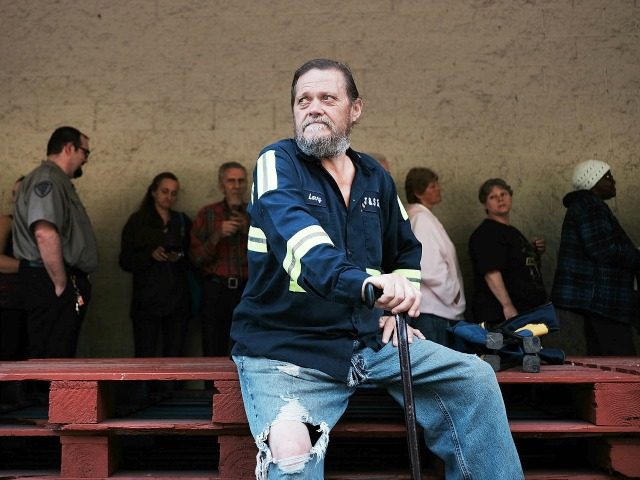Disabled people are getting more jobs, higher pay and greater social status in President Donald Trump’s “Hire American” economy, according to the Washington Post.
The good news comes as populist Republicans shut down another business-backed amnesty push in Congress, so adding more pressure on employers to find, hire and train the millions of Americans who have been sidelined by drugs, disability, and civic chaos.
The Post article does not give any credit to Trump or his “Buy American” policy as it reports:
Over the past year, the jobless rate for workers with disabilities has fallen at a faster rate than among the general population, dropping 2.7 percentage points, from 9.5 percent to 7 percent.
At the same time, the share of working-age people with disabilities in the United States who are employed — a historically low figure — hit 29.7 percent last month, up 1.7 percentage points from a year ago, according to the Bureau of Labor Statistics.
“Firms are more likely now to reach out in places they’ve never reached out before,” said Andrew Houtenville, research director of the Institute on Disability at the University of New Hampshire. “They’re also customizing jobs for people who might have previously been left out of the labor market.”
The article is headlined “She cleaned for $3.49 an hour. A gas station just offered her $11.25.”
The Post article adds more evidence to a March article in the New York Times which showed how disabled people are gaining in Trump’s economy.
The Post ignores the impact of Trump’s “Hire American” policy which has trimmed the inflow of illegals and has also blocked business’ demand for yet more foreign workers. Without enough workers, yet loath to start a bidding-war over employed workers, employers are looking for alternative sources of labor.
The exclusion of Trump’s labor-supply policy is a crucial omission because few of the disabled workers could have gained jobs or pay if employers were allowed to hire more illegal migrants or guest workers. Under Presidents George W. Bush and Barack Obama, the flood of hard-working illegals forced down wages for Americans and pushed up stock values for Wall Street investors.
Those wage-flattening, wealth-shifting policies would have continued if Trump had not jumped into the 2016 race.
Hillary Clinton promised during her 2016 campaign that she would not deport migrants who did not attack other people. “I want to, as I said, prioritize who would be deported: violent criminals, people planning terrorist attacks, anybody who threatens us. That’s a relatively small universe,” she said in March 2016.
GOP candidate Jeb Bush also promised to provide business with a vast increase in foreign workers. “I view fixing a broken [immigration] system as a huge opportunity to get to that four percent [national economic] growth,” Bush told roughly 600 Detroit-region business leaders in February 2015. “We can grow by 4 percent through all sorts of policies, but immigration has to be a part of it,” he insisted.
The GOP demand for cheap-labor also crippled Trump’s reforms in the Senate. In February, for example, Maine GOP Sen. Susan Collins an several other GOP Senators push a plan that would have blocked the deportation of nearly all illegal immigrants who are working for U.S. employers.
This business demand for imported workers — who double as imported consumers — is often underplayed by reporters at the Washington Post, which is now owned by immigration-advocate Jeff Bezos, founder of the Amazon retail empire. The empire relies on a huge number of warehouse workers, many of whom are getting wage raises in Trump’s “Buy American” economy.
Trump’s efforts to limit legal and illegal immigration is driving up wages and salaries for Americans in various locations and careers around the country. The beneficiaries include African-American bakers in Chicago, Latino restaurant workers in Monterey, Calif., disabled people in Missouri, high schoolers, resort workers in Hilton Head, construction workers, Superbowl workers, the garment industry, and workers at small businesses, and even Warren Buffett’s railroad workers.
Four million Americans turn 18 each year and begin looking for good jobs in the free market — but the government provides green cards to roughly 1 million legal immigrants and temporary work-permits to roughly 3 million foreign workers.
The Washington-imposed economic policy of economic growth via mass-immigration shifts wealth from young people towards older people by flooding the market with foreign labor. That process spikes profits and Wall Street values by cutting salaries for manual and skilled labor offered by blue-collar and white-collar employees. The policy also drives up real estate prices, widens wealth-gaps, reduces high-tech investment, increases state and local tax burdens, hurts kids’ schools and college education, pushes Americans away from high-tech careers, and sidelines at least 5 million marginalized Americans and their families, including many who are now struggling with opioid addictions.

COMMENTS
Please let us know if you're having issues with commenting.